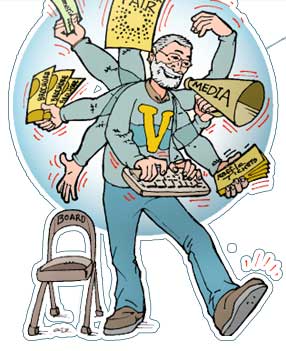








Summer Reading: Good Words to Focus On!
Brandon
Sun “Small World” Column, Monday, June 25 / 18
Zack Gross
Zack Gross
For some people, summer is not only golf or swimming season, but also reading season. During the winter, people may be too busy with studies or jobs, children or volunteer activities to make any reading progress.
The book companies often promote the idea of readers delving into long door-stopper sized books that are just easy summer reading. Here’s my slightly heavier, more noteworthy short list of books – both fiction and non-fiction - that I would suggest for the cottage, the backyard, the deck or the patio – and for the active mind!
It’s not often that I find myself reading not one, but two books that are on national bestsellers lists! I tend to read more “obscure” titles that don’t have as large a public following. But here I was recently reading The American War by Omar El Akkad, a former Globe & Mail journalist who has reported on violence from the Middle East to the streets of the urban USA.
This book is a realistic and depressing dystopian novel about the USA not too far in the future after a second Civil War, this time not fought over slavery but over the use of fossil fuels. It also takes place after the effects of climate change have caused loss of land, jobs and common purpose. While this book isn’t quite out of the headlines of today’s newspaper, it could be out of tomorrow’s. Social and historical tensions seem always to be near the surface in our world, and climate change might be the spark that ignites them.
Sharing the spotlight on the bestsellers lists at the same time was The Shadow Land by Elizabeth Kostova, the acclaimed author of a previous novel, The Historian. A beautifully written book, it tells a story of the impact of totalitarianism on a family and their co-workers and friends. While it is set in Bulgaria from the Communist Era to today, it could be about many countries in our world today.
A number of years ago, I bought a book by William Boyd. I found it difficult to get into, so I set it aside and didn’t pick it up again for a long while. I persisted on a second attempt and now can’t get enough of this British author who writes about war, colonialism and human relations in an off-beat, dark humour kind of way. His books are set in the 20th Century and often focus on the impact of the First World War.
A number of his books, such as Any Human Heart and The New Confessions actually take a person and follow them through their lifetime, which tends to encompass the 1900s, weaving a personal story through the issues of those years. An Ice-Cream War and A Good Man in Africa are centred in the so-called "Dark Continent," also great reading!
Finally, here is some non-fiction. Many of my columns are about global issues and I’m always on the lookout for new ideas and information that will grab our attention. Our society believes in economic growth – no successful political party is against it!
So, I was interested to hear about the book Doughnut Economics: 7 Ways to Think like a 21st Century Economist by Kate Raworth, who says that for our own futures, we need to think about sustainability and social good first of all. Notice the spelling of Doughnut – she’s a British professor and popular speaker. You can find her on YouTube and in TED Talks. Her doughnut is the graphic she uses to describe an economy that has a social foundation and an ecological ceiling.
It’s been a tough year. I’ve lost two of my favourite authors, as I am a devoted fan of mysteries, war-time spy novels and the like. We’ve lost Philip Kerr, author of the Bernie Gunther series, about a cop in Nazi Germany. Each book picks up a thread of Bernie’s life, as a soldier, a policemen, a private detective, a fugitive and more. Kerr was only 62 when he died.
And we lost Sue Grafton, she of the alphabet murders – "A is for Alibi," "B is for Burglar" – set in a mythical town in California and starring Kinsey Millhone, someone that over the two dozen books written became a friend. "Y is for Yesterday" was Grafton’s last.
But consider picking up either series – they are both addictive.
The nice thing about books is that you don’t have to buy them hard copy. You can borrow them from your local library, and you can download them to your electronic device. Books are an efficient and enjoyable investment for your entertainment dollar, your educational development and your soul.
Zack Gross is a former Executive Director of Brandon’s The Marquis Project and now co-ordinates outreach for Fair Trade Manitoba.
See my list from 2012:
Serious summer reading looks good to those around you!
* * * * *
Return to Articles page
Return to Articles page